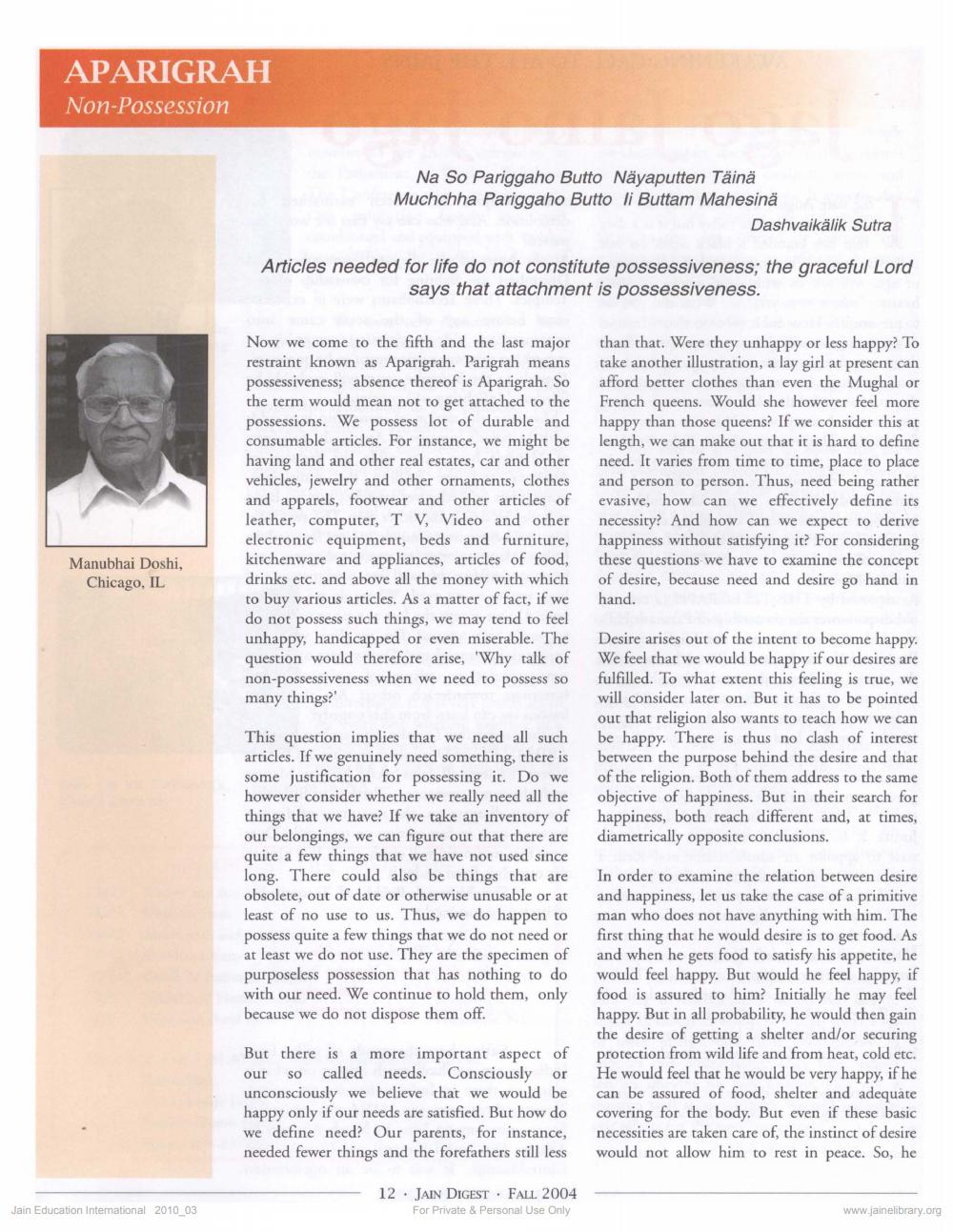________________
APARIGRAH Non-Possession
Manubhai Doshi, Chicago, IL
Jain Education International 2010_03
Na So Pariggaho Butto Nayaputten Tăină Muchchha Pariggaho Butto li Buttam Mahesinä
Articles needed for life do not constitute possessiveness; the graceful Lord says that attachment is possessiveness.
Now we come to the fifth and the last major restraint known as Aparigrah. Parigrah means possessiveness; absence thereof is Aparigrah. So the term would mean not to get attached to the possessions. We possess lot of durable and consumable articles. For instance, we might be having land and other real estates, car and other vehicles, jewelry and other ornaments, clothes and apparels, footwear and other articles of leather, computer, T V, Video and other electronic equipment, beds and furniture, kitchenware and appliances, articles of food, drinks etc. and above all the money with which to buy various articles. As a matter of fact, if we do not possess such things, we may tend to feel unhappy, handicapped or even miserable. The question would therefore arise, 'Why talk of non-possessiveness when we need to possess so many things?'
This question implies that we need all such articles. If we genuinely need something, there is some justification for possessing it. Do we however consider whether we really need all the things that we have? If we take an inventory of our belongings, we can figure out that there are quite a few things that we have not used since long. There could also be things that are obsolete, out of date or otherwise unusable or at least of no use to us. Thus, we do happen to possess quite a few things that we do not need or at least we do not use. They are the specimen of purposeless possession that has nothing to do with our need. We continue to hold them, only because we do not dispose them off.
But there is a more important aspect of our so called needs. Consciously or unconsciously we believe that we would be happy only if our needs are satisfied. But how do we define need? Our parents, for instance, needed fewer things and the forefathers still less
12 JAIN DIGEST⚫ FALL 2004 For Private & Personal Use Only
Dashvaikälik Sutra
•
than that. Were they unhappy or less happy? To take another illustration, a lay girl at present can afford better clothes than even the Mughal or French queens. Would she however feel more happy than those queens? If we consider this at length, we can make out that it is hard to define need. It varies from time to time, place to place and person to person. Thus, need being rather evasive, how can we effectively define its necessity? And how can we expect to derive happiness without satisfying it? For considering these questions we have to examine the concept of desire, because need and desire go hand in hand.
Desire arises out of the intent to become happy. We feel that we would be happy if our desires are fulfilled. To what extent this feeling is true, we will consider later on. But it has to be pointed out that religion also wants to teach how we can be happy. There is thus no clash of interest between the purpose behind the desire and that of the religion. Both of them address to the same objective of happiness. But in their search for happiness, both reach different and, at times, diametrically opposite conclusions.
In order to examine the relation between desire and happiness, let us take the case of a primitive man who does not have anything with him. The first thing that he would desire is to get food. As and when he gets food to satisfy his appetite, he would feel happy. But would he feel happy, if food is assured to him? Initially he may feel happy. But in all probability, he would then gain the desire of getting a shelter and/or securing protection from wild life and from heat, cold etc. He would feel that he would be very happy, if he can be assured of food, shelter and adequate covering for the body. But even if these basic necessities are taken care of, the instinct of desire would not allow him to rest in peace. So, he
www.jainelibrary.org




